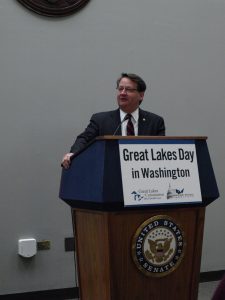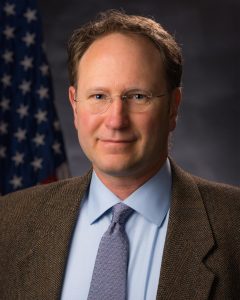
“You either value the lakes enough to spend on them, or you don’t.”
What do you do when you can no longer count on a once-reliable professional partner?
That’s the issue facing Great Lakes advocates – the commissions, initiatives, business alliances, Tribes and nonprofits that have worked since 2002 to restore the Great Lakes.
The once-reliable partner is the executive branch of the federal government.
Since the mid-point of the George W. Bush administration and through the Obama years the presidency has supported Great Lakes restoration. Yes, Bush was slow to fund projects and Obama couldn’t find his way to protect Lake Erie from toxic algae. But generally, progress was being made.
Now comes President Trump and U.S. Environmental Protection Agency Administrator Scott Pruitt.
Trump made his Great Lakes statement in March with the release of his budget that would eliminate all funding for Great Lakes restoration.
Pruitt dutifully supported the cut but flipped in July, saying money for the lakes is “a continuing need and we have to see that it’s adequately funded.”
Then comes this statement in October in an EPA National Water Program Guidance document for 2018-19 obtained by Great Lakes Now from the agency.
“The EPA’s funding of specific regional efforts such as the Great Lakes Restoration Initiative, the Chesapeake Bay, and other geographic programs will be discontinued. EPA will follow the direction of Congress on priorities associated with these programs.”
Conflicting messages from Washington
Would the conflicting messages from an administration in the process of down-sizing EPA and redefining its mission cause a reasonable person to wonder about the future of the relationship with a federal partner?
Great Lakes Now canvassed the region.
Former Great Lakes EPA executive Cameron Davis is concerned by what he sees coming from the Trump administration. He didn’t comment on the need for a new strategy but asked for continued support from Washington.
“Economic and ecological health are so intertwined that they can’t be separated. And for both to get stronger, businesses, trade groups, states, tribes and others could benefit from fewer conflicting, and more supportive signals from Washington,” Davis told Great Lakes Now.
Davis was overseer for the Obama EPA on Great Lakes restoration. He now works in the private sector.
Should states should invest more?
One group thinks it’s time for the states to step up.
Traverse City based FLOW thinks there’s too much emphasis on federal funding.
“The states are charged with protecting the public trust that is the Great Lakes. They should invest more themselves. Federal funding is welcome but is no replacement for state commitment,” FLOW policy adviser Dave Dempsey told Great Lakes Now.
Speaking personally, Dempsey went further.

Dave Dempsey, FLOW Senior Adviser, courtesy of brothersdempsey.com
“We all knew federal funding was vulnerable anytime a regime hostile to the environment took power in Washington. There’s no reason why Michigan, for example, can’t come up with $100, $200 or even $300 million on its own each year for the Great Lakes- if its government truly cares. You either value the lakes enough to spend on them, or you don’t.”
That would minimize exposure to federal unpredictably which has been a hallmark of the Trump administration. Dempsey says it’s up to advocates to offer a vision and pressure elected officials to adopt it.
Counter to FLOW and Dempsey’s preference, states like Michigan and Wisconsin may not be willing to assume a restoration leadership role. Legislators are focused on economic development at the expense of the environment.
Wisconsin recently weakened wetland laws to accommodate tech giant Foxconn’s arrival with a new factory. And Michigan is entertaining legislation that would prohibit agencies like the Department of Environmental Quality from issuing regulations more stringent than federal regulations. Federal regulations are generally seen as doing the minimum.
Trust in Washington remains
Others continue to place trust in Washington.
Todd Ambs told Great Lakes Now that the Healing Our Waters Coalition remains “fully committed” to work for federal funding. Ambs is Campaign Director for the nonprofit.
Ambs said as long as Congress keeps the money coming “…we are confident that the federal agencies will follow the rule of law and administer the restoration programs as directed.”
Great Lakes Now asked Michigan Sens. Debbie Stabenow and Gary Peters and Illinois Sen. Dick Durbin if it’s time to examine Great Lakes restoration strategy.
In a statement, Peters noted the support for the Great Lakes in Congress.

Michigan Senator Gary Peters, courtesy of HOW Coalition
“President Trump may not think protecting the Great Lakes is an important priority, but Congress, which is responsible for actually providing the funds, has a strong record of supporting this critical program. I will continue working with my colleagues to ensure the Great Lakes Restoration Initiative (GLRI) is a priority and receives the necessary funding, Peters said.”
A spokesperson for ILL. Sen. Durbin acknowledged the “uncertainty coming from the Trump administration” but said there has been ongoing bipartisan support for the Great Lakes.
The spokesperson noted that EPA Administrator Pruitt has said that “Great Lakes restoration is protecting public health in the Great Lakes more than any other coordinated interagency effort in U.S. history…”
Sen. Stabenow’s office did not respond to a request to comment.
Jon Allan told Great Lakes Now that Michigan Gov. Snyder “will continue to work with the Michigan Congressional delegation to support full annual federal funding of GLRI.” Allan directs Michigan’s Office of the Great Lakes.
“In the past, the Governor has worked with the congressional delegation to restore proposed cuts to GLRI by both the Trump and Obama administrations,” Allan said.
Congress has voted to fund the full $300 million for the Great Lakes for 2018 but there has been speculation that regional offices would be consolidated as the EPA’s downsizes. Congress has approved an overall budget cut of 6.5 per cent for the agency.
Great Lakes Now asked the EPA if it would continue to maintain the Chicago office that manages Great Lakes programs.
Spokesperson Enesta Jones’ response did not mention the Great Lakes office specifically.
Jones said “EPA will follow the direction of Congress on priorities associated with these programs, which will be determined through the annual appropriations process in FY 2018 and beyond.”





